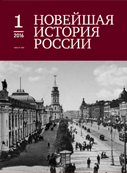Продовольственная комиссия Военного Совета Ленинградского фронта в 1942 г.
The Food Commission of Leningrad Front Military Council in 1942
Author(s): Gennady Leontievich Sobolev, Michail Viktorovich KhodyakovSubject(s): History, Recent History (1900 till today), WW II and following years (1940 - 1949)
Published by: Издательство Исторического факультета СПбГУ
Keywords: The Food Commission; the Military Council of the Leningrad front; the blockade of Leningrad;1942
Summary/Abstract: In the article based on archival materials, it is considered the history of creation and the initial phase of functioning of the Food Commission of the Military Council of the Leningrad front. The work of the Commission has not received full coverage in the historical literature up to present day. The authors show how in the most dramatic period of the siege of Leningrad in the winter 1941/1942 the distribution of scarce food supplies in the besieged by enemy troops city was carried out. The article presents the personnel of the Food Commission, which at its inception in January 1942 included: the Second Secretary of the City Party Committee A. A. Kuznetsov; authorized representative of the State Defense Committee on the food supply of the Leningrad front and the city’s population D.V Pavlov, the Chairman of the Leningrad City Council P. S. Popkov, and the Chairman of the Leningrad Regional Council N. V. Solovyov. The Commission received the right to deal with all issues related to the increase in the consumption of food for both civilian and military organizations as a whole, and individuals. At the same time, the Commission was to proceed from the limit set by the Military Council of the Leningrad front. Throughout 1942, the Commission meetings were attended by the Secretary for Trade and Industry of the Leningrad Party Council P. G. Lazutin, as well as Deputy Chairman of the Leningrad City Council and head of the Department of trade I. A. Andreenko. According to the authors, the activity of the Food Commission in 1942 was aimed at supporting the social and professional groups vitally important in the city’s surviving; those whose work had great impact on the fate of the besieged city: industrial workers, managers of plants and factories. At the same time, the Commission gave support to a rather narrow layer of prominent scientists and cultural figures.
Journal: Новейшая история России
- Issue Year: 6/2016
- Issue No: 15
- Page Range: 8-21
- Page Count: 14
- Language: Russian

